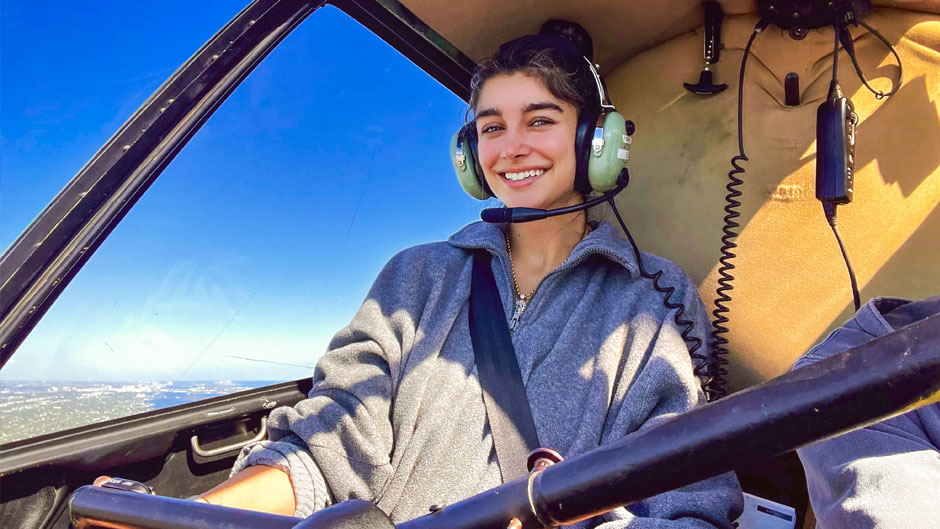From 1,500 feet in the sky, the circular helipad atop the downtown Fort Lauderdale high-rise looked more like a small saucer for a cup of java than a large, sturdy landing platform.
But Tuana Yazici kept her cool. With her hands at the controls of a two-seat Robinson R22 helicopter, she guided the craft lower and lower, making a textbook nighttime landing onto the helipad.
Learning to fly helicopters is just one of the myriad challenges this 21-year-old University of Miami graduate student has taken on. She speaks four languages; has led a successful crusade to free hundreds of abused carriage horses in her Turkish homeland; has written and illustrated four children’s books, donating the proceeds to animal rights groups; and exhibited her artwork in galleries around the world.
Now, Yazici has embarked on what could be her most difficult test—one with implications literally out of this world.
As a space law and political affairs intern for the Colorado Springs-based Space Foundation, she is helping to raise awareness about and propose sweeping policy changes for the peaceful exploration of the expanse that exists beyond Earth and its atmosphere.
“It’s absolutely paramount that nations conduct space exploration in a responsible manner,” said Yazici, who graduated a year early from the University with a degree in philosophy, politics, and economics, and is now on pace to earn a Master of Arts in international administration from the College of Arts and Sciences this May. “No nation can address the critical issues involved in this area alone; a cooperative, collaborative approach is needed,” she said.
In her recent white paper published in the Space Foundation’s annual Space Report, she not only examines three of the biggest barriers to the future of international space—the Artemis Accords, the legality of anti-satellite (ASAT) weapons, and the mitigation of space debris—but also offers recommendations on how the United States and other spacefaring countries can address and resolve those issues.
Three years after NASA unveiled Artemis, a program to return astronauts to the lunar surface, including the first woman and first person of color, the space agency announced its ambitious Artemis Accords—a series of principles, guidelines, and best practices to govern the civil exploration and use of outer space.
So far, 15 nations have signed the accords, which Yazici passionately supports. But key space powers such as China, India, and Russia have yet to sign the agreement, nor have many of the European Space Agency (ESA) states or African nations.
“The U.S. should be open to discuss and negotiate terms of the Artemis Accords with all international actors to avoid complications in the future,” said Yazici, noting that one sticking point of the accords could involve “safety zones” surrounding space operations, which would allow governments to protect their research from harmful interference.
“What will happen when nations that have not signed the accords cannot participate in the zones?” Yazici questioned. “If the U.S. negotiates the terms dictated by nonsignatory states, getting the major space-capable states on board, it will set up a great foundation for future peaceful exploration in space.”
Designed to disable or destroy satellites, ASAT weapons can produce an enormous amount of orbital debris. Yazici said the United States should push for stronger limits on such weapons. Specifically, she hopes the U.S. both advocates for an amendment to the Outer Space Treaty of 1967 to ban such weapons and rekindles talks on a 2014 Russian and Chinese treaty proposal aimed at preventing the deployment of weapons in outer space.
With nearly 8,000 satellites in orbit, “space highways” are experiencing their own form of traffic gridlock, increasing the likelihood of collisions. But not all those satellites are operational; some are derelict spacecraft, so decreasing the amount of space debris is crucial, Yazici said.
Nations, she explained, must allocate money toward an international fund to mitigate space debris, and the U.S. could help lead the way by implementing a program similar to ESA’s Clean Space initiative to help keep Earth’s orbital environment free of debris.
A United Nations Office for Outer Space Affairs Space4Women mentee, Yazici will meet with members of Congress in the coming weeks to present her research and recommendations. And she is scheduled to speak at the 37th Space Symposium, April 4-7, in Colorado Springs, Colorado.
She is a prospective member of the International Institute of Space Law (IISL), and during the International Astronautical Congress in Dubai last October, she gave a presentation on the IISL Space Law Knowledge Constellation Project, for which she is the creative brand and visual identity manager.
Yazici plans to attend law school, specializing in international law and continuing to address issues in space law after she graduates.
And a brief trip to outer space could also be in the cards. “Somehow,” she said, “I’d fit it into my schedule.”

